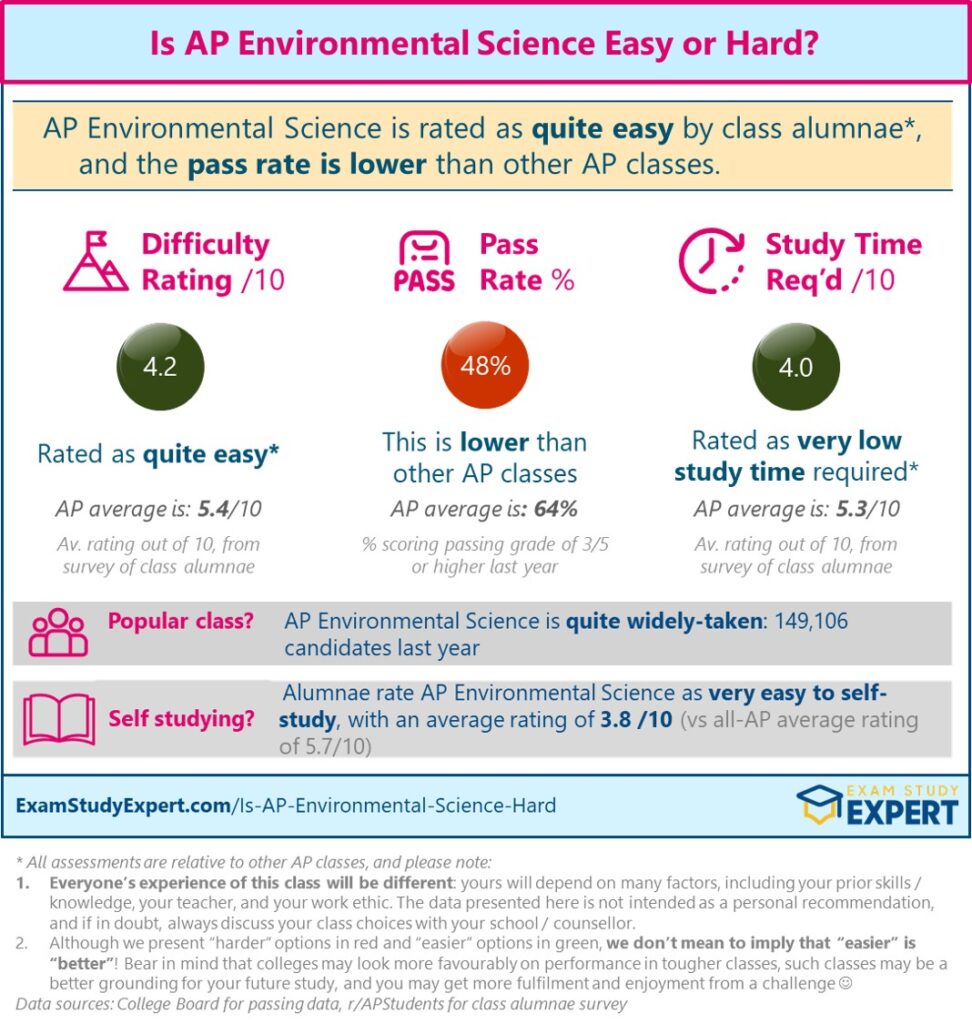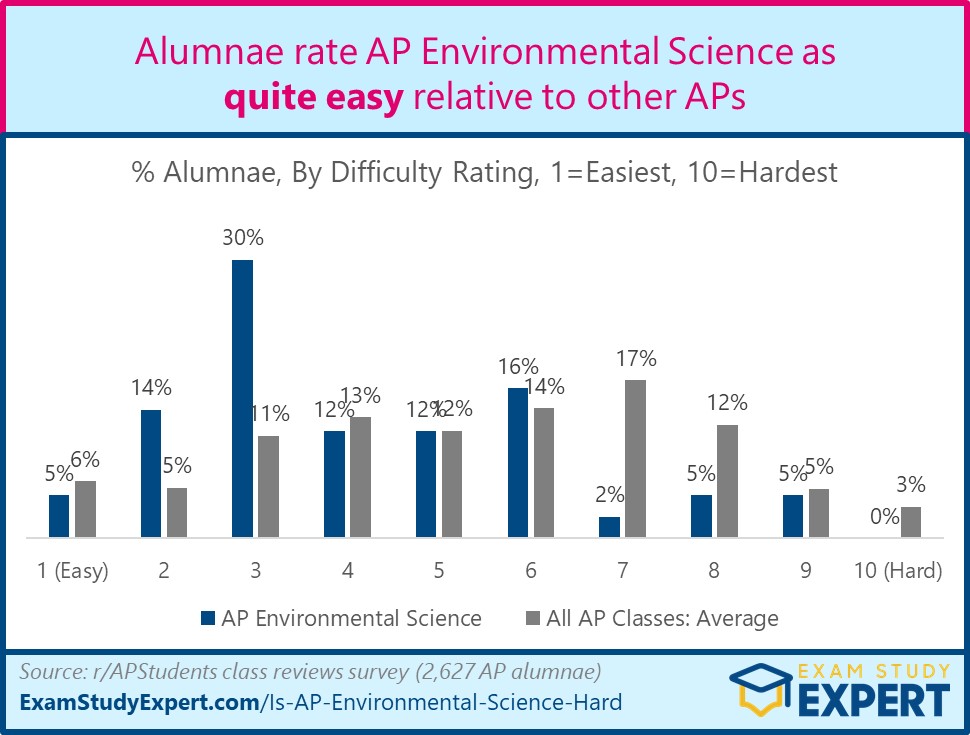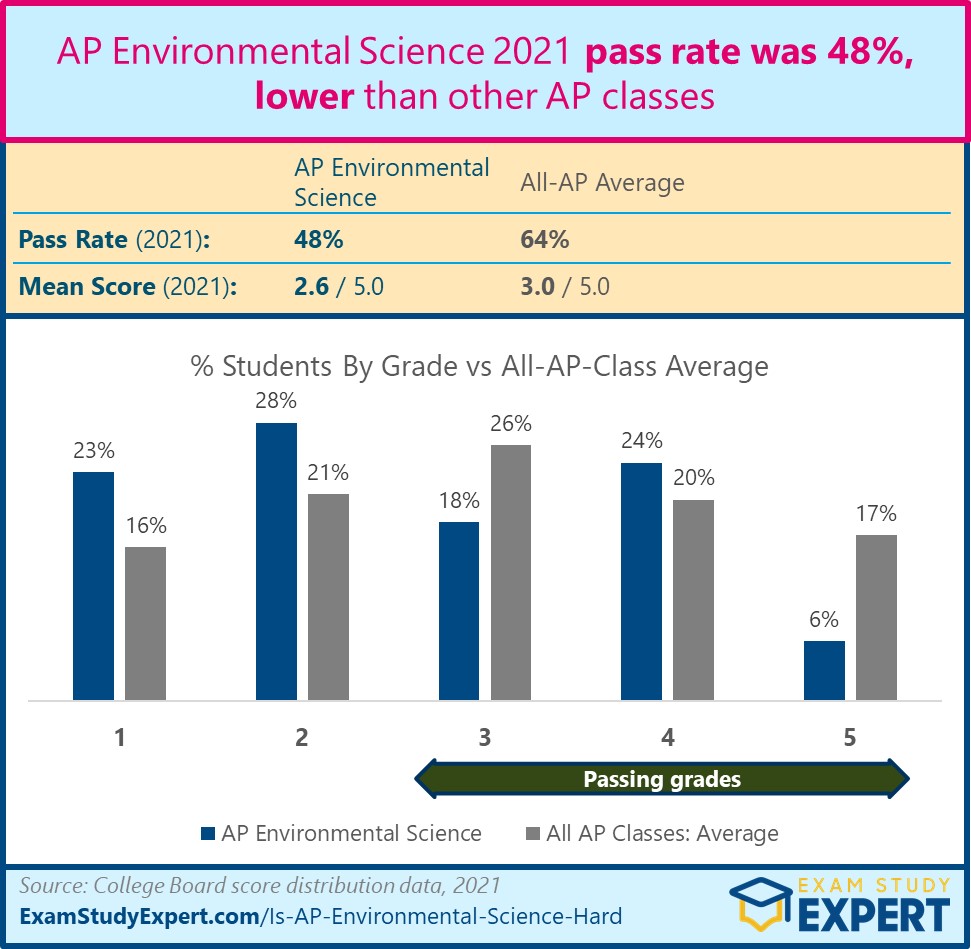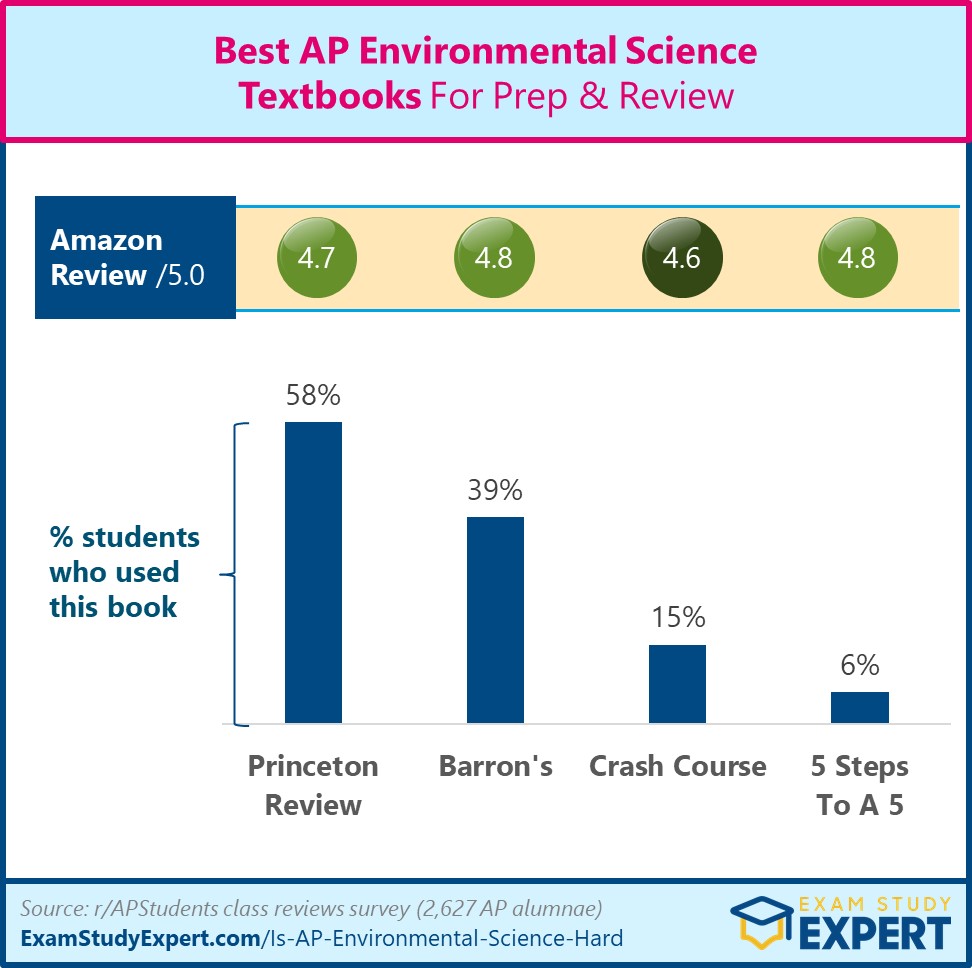How Easy is It to Self Study Ap Environmental Science
Is AP Environmental Science easy or hard? We reveal the AP Environment difficulty rating, based on a unique combination of 2021 pass rate data, and 2,627 class reviews from real AP alumnae collected by r/APStudents.
- Is AP Environment Easy Or Hard?
- How Hard Is AP Environmental Science: 43 Real AP Environment Alumnae Share Their Experiences
- What Does It Take To Succeed: How To Study For The AP Environmental Science Exam
- Best books and test prep resources for AP Environmental Science
- Where next?
Is AP Environment Easy Or Hard?
AP Environmental Science is considered quite easy, with class alumnae rating it 4.2/10 for overall difficulty (the 23rd-most-difficult out of the 28 large AP classes surveyed).
The pass rate is lower than other AP classes, with 48% graduating with a 3 or higher.
AP Environment is quite widely-taken (149,106 entries last year), and 93% would recommend the class.

AP Environment is a very broad course, encompassing elements of several earth, life and physical sciences. Alumnae reviews focus on the importance of common sense, basic math, and overall ease of studying for the class.
You can see how AP Environmental Science compares to other classes for difficulty in the below chart:

We've highlighted AP Environmental Science and related scientific classes (Psychology, Biology and Chemistry) only – to see the full version of this chart, check out our article ranking ALL the AP classes from easy to hard.
You can read more about AP Psychology, AP Biology and AP Chemistry here.
How Difficult Is AP Environmental Science – As Rated By Class Alumnae
AP Environment is considered quite easy, with class alumnae rating it 4.2/10 for overall difficulty, making it the 23rd-most-difficult out of the 28 large AP classes surveyed.

What Is the AP Environmental Science Pass Rate 2021?
The AP Environment 2021 pass rate was lower than the all-AP-classes average, at 48%. Only 6% of candidates were awarded a 5, with the highest percentages receiving a 2 (28%), 4 (24%) and 1 (23%).

AP Environment Pass Rate / Score Distribution Over Time: 2021, 2020, 2019…
The AP Environmental Science score distribution did not vary significantly between 2017 and 2020, with 2020 a notably successful year. However, in 2021 the pass rate dropped slightly to only 48%.

Is AP Environmental Science Time Consuming To Study: As Rated By AP Environment Alumnae
AP Environment is rated as very low study time required relative to other AP classes.
A survey of AP alumnae asked for a rating out of 10 for time needed to study each class, with 1 = least time needed, 10 = most time. The average rating for AP Environmental Science was 4/10 (vs the average across all AP classes of 5.3/10).

Is AP Environment Easy or Hard To Self-Study
AP Environment is rated as very easy to self-study relative to other AP classes.
A survey of AP alumnae asked for a rating out of 10 for how easy each class is to self study, with 1 = easiest to self study, 10 = hardest to self study. The average rating for AP Environmental Science was 3.8/10 (vs the average across all AP classes of 5.7/10).

If you're looking forward to taking AP Environment, it's important to take both the positive and negative feedback in context. There are multiple factors that could contribute to a great or poor experience of the class, such as your teacher, struggling with science, and your personal preferences as a learner.
An impressive 93% of AP Environment alumnae would recommend the class.
The majority of the reviews focus on course enjoyment, the importance of vocabulary and common sense, the need for basic math, and helpful study methods.
1. AP Environmental Science is full of common sense applications
"The essays are common sense application of basic environmental science concepts and the multiple choice require only surface level knowledge of a few ES principles." – AP Environmental Science Score: 5
"The test is a lot more of common sense than you think. … Also know your math equations as your bound to get at least one on an FRQ." – AP Environment Score: 4
"As long as you have common sense about nature and the world, you're in good hands." – AP Environment Score: 5
2. You'll need to know a basic math too
"You don't have to know any math past long division. Super easy math wise." – AP Environmental Science Score: 5
"Know how to do basic math without your calculator. It'll save your ass in the frq's…" – AP Environmental Science Score: 3
"To be honest, the only reason why I got a 5 on this test was because I did this test in 2020 and I did not get asked a single math question. But if you're not very math/science oriented [but] want to take an AP science course, definitely take this one because half of what you need to know is memorizing vocabulary!" – AP Environmental Science Score: 5
3. Lots of students enjoyed AP Environment and found it easy …
"No class that I have ever taken, has taught me as much about how the world works than this course." – AP Environment Score: 4
"It's a good and easy class to take if you're a sophomore, and it's way easier if you have previous AP Human Geography knowledge. Just make sure to practice FRQs and review your textbook if you get confused on things." – AP Environmental Science Score: 5
"Ez pz lemon squeezy, also study up on your cycles and know how eutrophication works" – AP Environment Score: 5
"Took this as a freshman, and did not know what to expect (hence the 4.) However, it was a super easy class (this comes from someone who has a natural aptitude for math and memorizes especially well.. so take my advice with a grain of salt) and it was mostly common sense. Wish I had just studied a bit more so I could have gotten that 5. Rip" – AP Environmental Science Score: 4
"'MC tests very specific, random things, but FRQs are generally easy and only cover big topics." – AP Environmental Science Score: 5
4. … and found it easy to self-study
"I self-studied this exam over a weekend using the Smartypants guide and made an easy 5." – AP Environmental Science Score
"Had to read the entire textbook on my own and learn this course basically as if it was a self-study due to the teacher. Regardless, I still got my five, so that goes to show how interesting and easy the information is to pick up." – AP Environmental Science Score: 5
"Just study a lot and you'll be fine" – AP Environment Score: 4
"APES is pretty easy to self-study as it is mostly memorization, but if your school offers APES as a course it may still be worthwhile to take, should your school's class include fieldwork, which is not only fun but great experiences in preparation for college." – AP Environmental Science Score: 5
5. On the downside, a small minority of students found AP Environment challenging
"it's not a very easy class, since there's so much content, so only take if you have a good teacher or a fantastic study plan. practice your frqs." – AP Environment Score: 3
What Does It Take To Succeed: How To Study For The AP Environmental Science Exam
What is AP Environment? Course Outline & Requirements
According to College Board:
The AP Environmental Science is an interdisciplinary course, "embracing topics from geology, biology, environmental studies, environmental science, chemistry, and geography". The course requires students to "identify and analyze natural and human-made environmental problems, evaluate the relative risks associated with these problems, and examine alternative solutions for resolving or preventing them".
AP Environment is designed as the equivalent of a one-semester introductory college course. The course requires that "students have the opportunity to spend a minimum of 25% of instructional time engaged in hands-on, inquiry-based laboratory and/or fieldwork investigations".
Prerequisites for AP Environment are two years of high school laboratory science ("one year of life science and one year of physical science"), and at least one year of algebra. An earth science course is also desirable.
You will develop skills in:
- Engaging with scientific principles, methodologies, and concepts
- Explaining and analyzing (visual) concepts
- Analyzing scientific experiments and data
- Applying quantitative mathematical methods
- Proposing and justifying environmental solutions
The exam consists of one 2 hour 40 minute exam, with 60% (90 minutes) of multiple-choice questions (MCQs) and 30% (70 minutes) of free-response questions.
For more details, see: College Board's AP Environmental Science course page.
Examiners' Reviews: Takeaways From AP Environmental Science Test Assessors
College Board released the following official comments about the 2021 exam results:
- "As usual, students scored significantly higher on the multiple-choice section than on the free-response questions."
- "In fact, the difference between multiple-choice and free-response performance on the AP Environmental Science Exam is the largest of any subject so far this year: on average, in the multiple-choice section students are earning twice as many of the points possible as they're earning in the free-response section."
Multiple-choice section
- "AP Environmental Science students' mastery of Unit 8, Aquatic and Terrestrial Pollution, is astonishing, the highest performance on any unit in any subject so far this year. An amazing 64% of students earned virtually perfect scores on questions about this unit."
- "Performance is generally very strong across all units, except for Unit 1, Ecosystems. 10% of students were unable to answer more than 1 such question correctly, and if student understanding of this unit were as strong as it was of the other units, scores would have been significantly higher."
- "Many students struggled with questions that required Science Practice 4, analysis of research studies and the design of research methods. 10% of students were unable to answer any such questions correctly."
- "Students were also generally weaker at applying Science Practice 6, Mathematical Routines, with fewer correct answers on such questions than on most other multiple-choice categories."
For best results, you may therefore want to consider investing a little extra study time in Unit 1 "Ecosystems" and Science Practices 4 and 6, which are, respectively: "Scientific Experiments" and "Mathematical Routines".
For more details, see: College Board's AP Environmental Science 2021 exam results page.
How To (Self) Study AP Environment: Advice From Class Alumnae
Be prepared and start studying early
"Start studying a month or two before the exam — it's a super easy exam if you know basic science. just don't start studying the weekend before (with most of the studying the morning before the exam) like I did" – AP Environmental Science Score: 4
"Practice writing frqs a lot. know big ideas and concepts. needs some memorization of things. exam is NOT difficult IF you're decently prepared" – AP Environmental Science Score: 5
Know the basics of each unit because it's a broad course!
"Be sure to know the basics of every unit. They'll also want you to apply one unit to another, so know how the different units affect each other. Make flashcards from all of the key terms in your review book and you should be fine." – AP Environmental Science Score: 4
"At this point the test covers general science, biology, chemistry etc. you'll be better off with a broad, general understanding of basic scientific concepts than a narrow, specialized view of a set amount of topics (which is probably why I got a 4 instead of a 5)" – AP Environmental Science Score: 4
"Know big ideas. Use Quizlets online. Practicing FRQs especially math calculations (yes u heard that, there's a little bit of math and it's pretty basic but most people shouldn't blow it off)." – AP Environmental Science Score: 4
Knowing the vocab can be crucial for success
"Remember definitions, examples and concepts." – AP Environmental Science Score: 5
"Just know all your terms and practice a few free responses. You'll be ready." – AP Environmental Science Score: 5
"The main thing you need to study is vocabulary as the test may try to throw you off with big terms for simple topics, and it never hurts to put those in your essays." – AP Environmental Science Score: 4
Best books and test prep resources for AP Environmental Science
The most popular textbook for test prep and review for AP Environment is Princeton Review, used by 58% of students. It has an average rating of 4.7/5.0 from reviewers on Amazon.com.

Other popular AP Environment test prep / review books and resources for include:
- Barron's
- Crash Course
- 5 Steps To A 5
Where next?
Find out how AP Environmental Science compares to other classes: click here for an overview of all AP Classes ranked by difficulty, from easiest to hardest.
Wishing you every success in the class!
- About
- Latest Posts
Source: https://examstudyexpert.com/is-ap-environmental-science-hard/
0 Response to "How Easy is It to Self Study Ap Environmental Science"
Post a Comment